Diamond Head Hike: Exploring the Stunning Summit and views of Hawaii’s Iconic Landmark
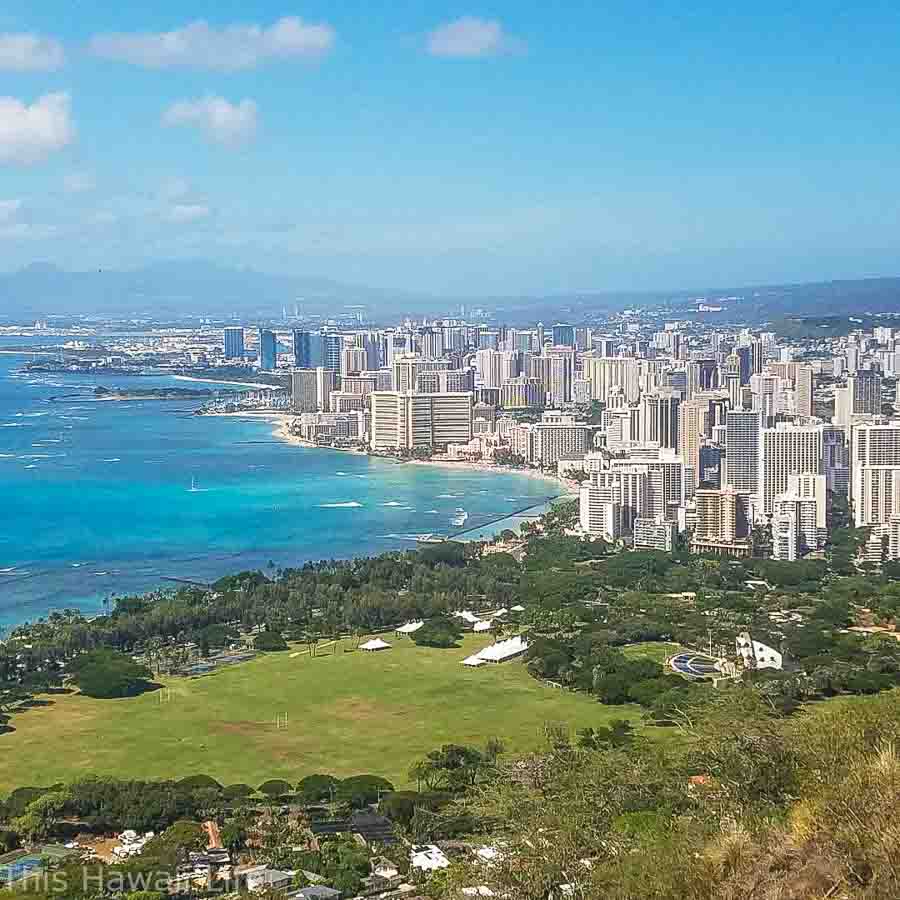
When you visit Honolulu, one of the must visit sites to start off your vacation in Oahu is to do the Diamond Head hike and experience the climb up the Diamond Head crater to see the magnificent views from the top.
This iconic crater developed half a million years ago into an impressive lava formation that sits at the edge of Waikiki. Diamond head Hawaii is an iconic landmark on the Waikiki Waterfront.
Everyone visiting will want to climb up and capture their prized images and selfies of of the Waikiki skyline. It truly is a fantastic experience to see Honolulu from above and a large part of the eastern side of the island to the North Shore.
Check out why this Diamond Head hike should be on the top of your list in visiting Honolulu soon.
Quick Plan your Honolulu Itinerary
Are you in a rush on a last-minute trip to Honolulu? Well then, try our jump start guide to book the best tours and hotels
below.
Pro Tip – Since you are planning to visit Diamond Head and Waikiki tour here to enjoy with great views and tour of Waikiki Beach.
Top Tours to Try in Honolulu
Complete Pearl Harbor Experience – Day Trip Tour
Grand Circle Island Tour – Top Rated
Sunset Cocktail Cruise – Easy tour with pick up
Where to Stay in Honolulu
Ilima Hotel – Budget Option , Personally tried
Holiday Inn Express Waikiki – mid range
Halepuna Waikiki – Honolulu luxury hotel or resort
Experience the Diamond Head hike (Le’ahi) crater in Oahu

Visiting Diamond Head State Monument
The state park entrance is open seven days a week and with parking available at $5 per car and entry to hike the trails at $1 per person. You pay at the gate entrance and drive directly to park entrance or park if you are driving. There is a visitor center with souvenir stand, restrooms and even a food truck for cool drinks and fresh pineapples that you can visit and relax before you begin your Diamond Head hike.
how to get to Diamond Head from Waikiki
There are a few key ways to get to Diamond Head from Waikiki and the main entrance area which is on the northeast end of the park entrance. Here’s the main options on easily getting to the park and doing the Diamond Head hike.
- Take an Uber – easy access on your phone app to book a trip to Diamond Head, it’s hassle free to book directly with Uber. The difficulty tends to be the return trip and price increases due to less availability when you are waiting for a return trip.
2. Go by bus – taking the bus to and from Diamond Head is definitely the affordable option at $3 per direction. You just need to check the schedules on when the bus goes in either direction to the bus stop right at the entrance to the park grounds. You can also get a day pass on the bus to visit many other attractions around the island.
3. Drive yourself – if you have access to a car then driving to the park is fast and easy and parking per car is only $5 for the whole day. The is also a per person entry fee of $1 per person.
4. Walk to the entrance – A very long walk from Waikiki, it is doable but definitely takes a bit of time and you have a lot of walking to do right from the start of the park entrance
5. Take the cable car buses – these regular trolley buses plying through the Honolulu and Waikiki areas stop directly at the park entrance. You can book a day pass directly with the Waikiki trolley lines for trips to most attractions in the Honolulu area.
Here’s some updates on the online reservation for Diamond Head and some other tips to visiting
History of Diamond Head State Monument
Created between 400,000 to 500,00 years ago, the Diamond Head crater was created from the Ko’olau volcano which is over 2 million years old. Diamond head was created during the same time frame as the Punchbowl and Koko eruptions were also happening on Oahu.
Ancient Hawaiians used the site as a place of worship and did animal and human sacrifices on the slopes of the crater. The Hawaiian’s called the site Le’ahi for the shape representing an ahi (fish) forehead.
The name Diamond Head was given to the crater after early western explorers and traders visiting the area mistook the the crater’s calcite crystals for diamonds and the English name Diamond Head stuck.
In the 1900s Diamond Head was converted into a military base with bunkers and artillary and other buildings in the base inside the crater and bunkers and lookouts built on the tops of the summit area to protect the island.
Eventually the Military deeded the property to the state which turned it into a state monument and park in 1965 for the public to enjoy and climb to the top for an only in Oahu experience with amazing views around the southern part of the island on the rim of Diamond Head.
Here’s a video explaining some more fascinating things to know about Diamond Head below
Starting the Diamond Head Crater hike
There is a Diamond Head trail marker past the restrooms that shares the history of Diamond Head and how it was used in the past to present day. The trails are paved and easy to follow from the start and then change into gravel and sand when the trail starts uphill. It gets narrow at this point and traffic does get busy for both uphill and downhill climbers.
For those early birds here’s a look at the Diamond Head Crater hike in the early part of the morning to see a gorgeous sunrise from above.
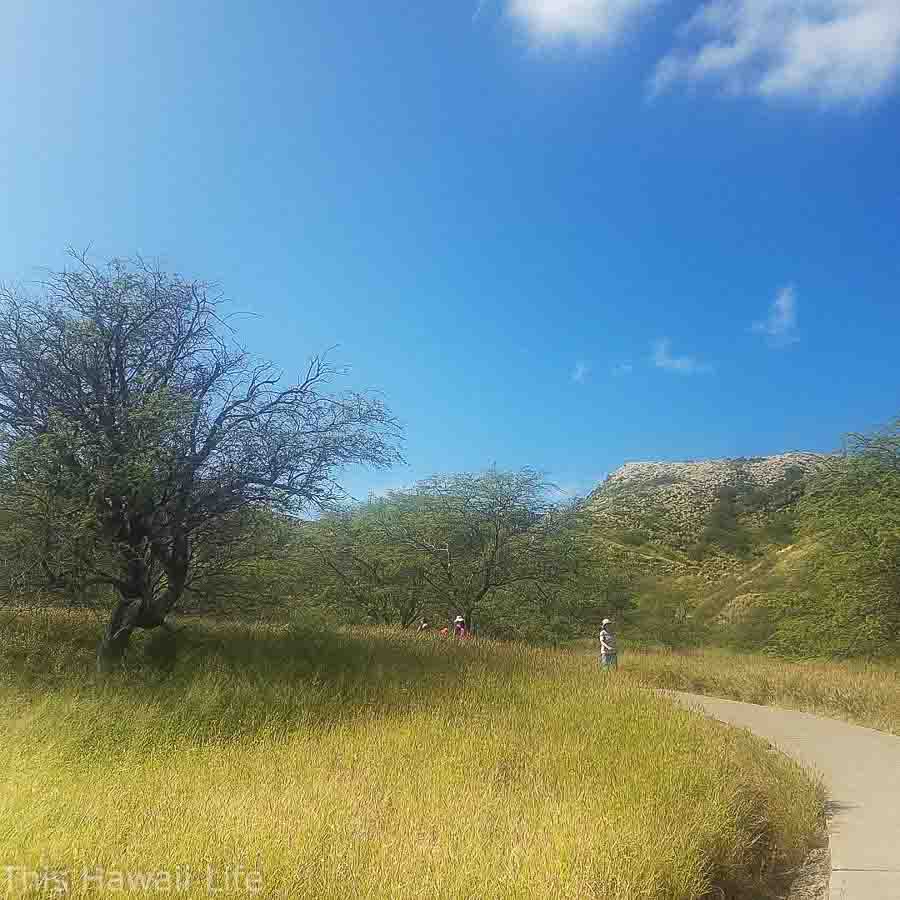
The average time to do the Diamond Head hike is about two hours round trip, more if you take more time for pictures and time frame that you are busy. The best time to visit is earlier in the morning or late in the afternoon to avoid crowds and excessive heat going to the top.

Check out this gorgeous aerial drone of Diamond Head and panoramic views

Look out points from the Diamond Head hike
Along the way to the top of Diamond Head are many lookout points to the crater floor and views to the east side and coastal views. At the the mid point, you’ll hit your first set up stairs which then leads to a long dark tunnel and eventually a circular staircase that is a real work out so take your time.
Tip – Those that are physically challenged should take plenty of rests with benches located throughout the trail areas.

Tip – if you don’t want to enter the tunnel and circular climb, you have an option to do the route from the left side to nice views and a slower climb to the top without doing the circular stair case.
Entering the long dark tunnel at Diamond Head towards the summit area
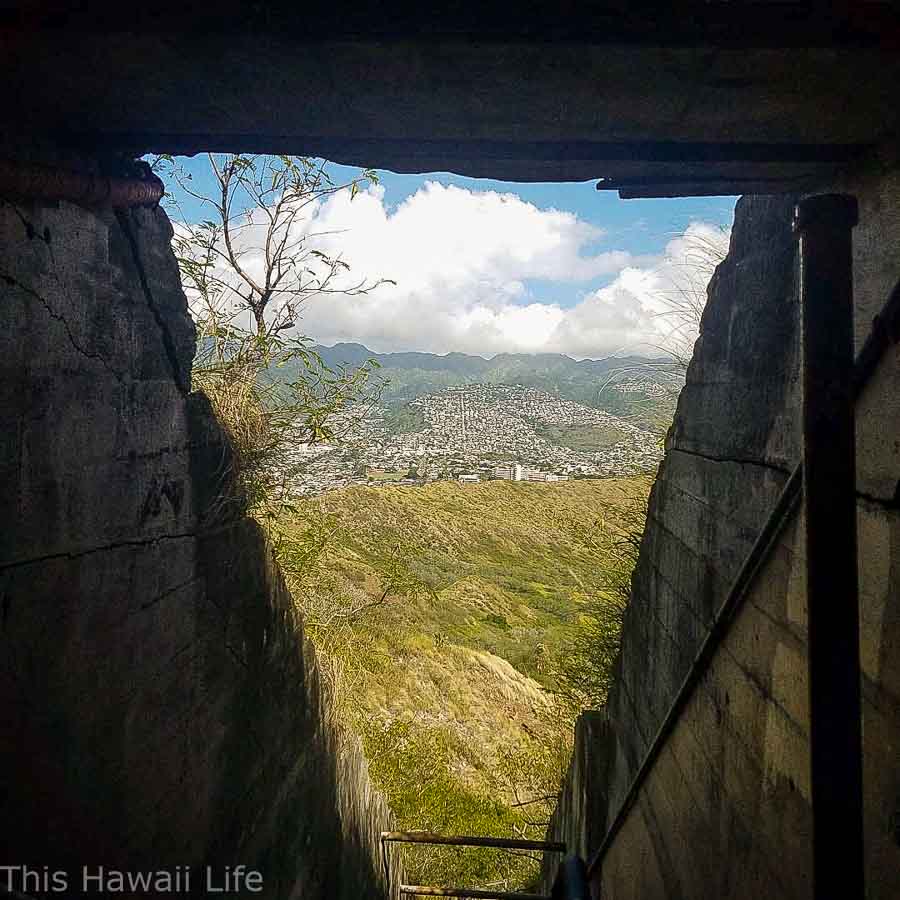
Climb a circular stair case to the top
After the tunnel area, you enter another climb with a circular stair case to the top of Diamond Head and the bunker areas. (You can choose to go on the left side option after the first stairs if you choose not to go up the circular stairs).
Tip – Take your time going up the stairs because it is used for climbing and also descending.

Reaching the top of the Diamond Head hike and the crater rim
After you pass through the staircase you finally get to the opening with nice views of the areas below, but there is another short staircase with a viewing platform created from an old bunker that is very busy so can your time enjoying the views and doing your selfies of gorgeous Waikiki and Honolulu.

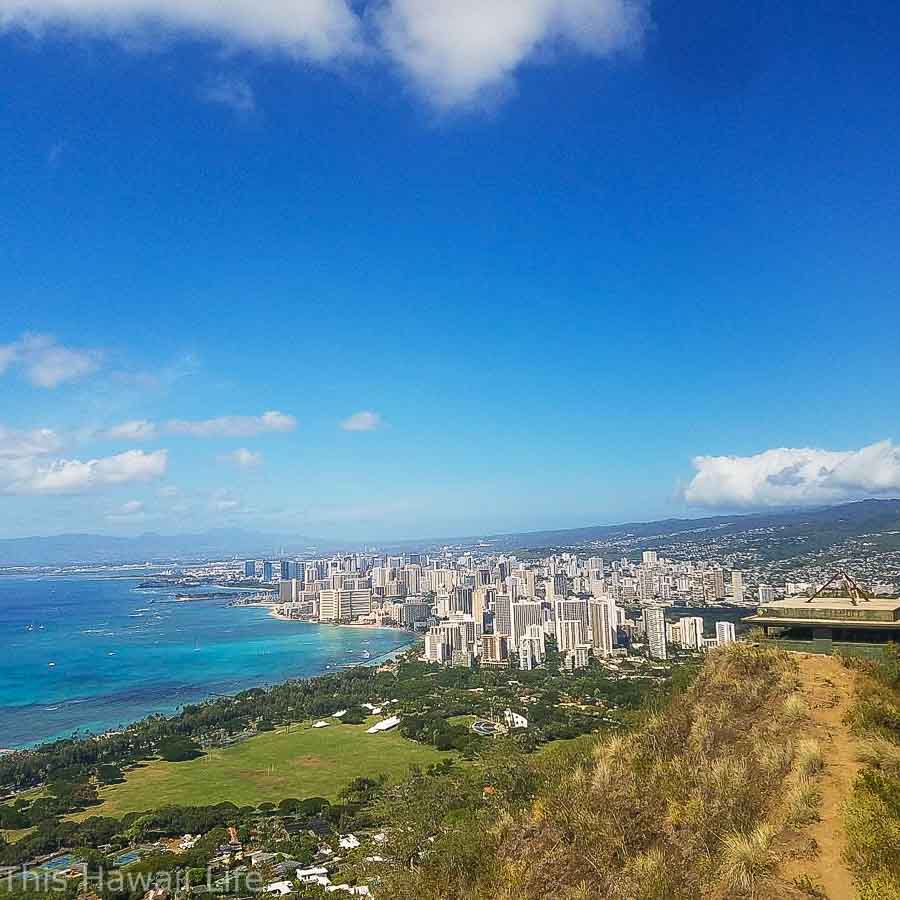
You’ll see a variety of bunkers situated around the rim areas of the Diamond Head summit areas.
Tip – These areas are typically off limits for visitors to hike to, please do not attempt to hike to them.

Observation Point at the summit
The highest point of the summit is an old radio tower which has some observation areas to see mostly the downtown Honolulu and Waikiki Beach area and it is stunning. There are no covered areas up here for shelter so be prepared for complete sun at the summit and trails
Descending Diamond Head
You have an option of climbing back down the circular staircase but the best route back to the Diamond Head crater valley is to take the slow declining route on the left side with nice views of the east side coatline, beaches and the ritzy areas of Diamond Head, Lanikai, Portlock and Kahala.
It’s typically nice and breezy on this easy downhill route with not stairs until it connects to the main route midway.
Tip – there are many scenic vistas on the downhill portion of the walk, enjoy your time doing this and capture some fun selfies.

Check out this beautiful light house below


The trail eventually connects back to the main trail and stairs down to the crater floor and in no time you get back to the restrooms and visitor center.
Tips on doing the Diamond Head hike to the crater rim
- Bring plenty of water or you can purchase at the vending machines when you enter the park.
- It is very hot and busy mid day so if you want to avoid both go early or later in the morning
- You can take various transportation modes and the cheapest is the bus coming from Waikiki and costs $3 one way
- Wear good shoes, the climb is over 560 feet over mixed terrain
- Bring sunscreen, the sun is harsh mid-morning to later afternoon
- Diamond Head is not ADA compliant and a challenge for non-active visitors
- There are no bathrooms at the top of the lookout areas.
Check out this Diamond Head video showing highlights of the park area below
Here’s another fun Diamond Head video impression to visiting and other bits of information to know.
More details and interesting facts about Diamond Head Crater
Here are some cool facts about Diamond Head Crater:
- Diamond Head is a volcanic tuff cone that formed over 300,000 years ago during a single, explosive eruption.
- The crater got its name from 19th-century British sailors who thought they discovered diamonds in the rocks, which turned out to be calcite crystals.
- The US military used Diamond Head as a strategic lookout point during World War II, and there are still bunkers and observation posts located inside the crater.
- The hiking trail to the summit of Diamond Head is 0.8 miles (1.3 km) long and includes 175 steep and uneven stairs, a spiral staircase, and a dark tunnel.
- At the summit, visitors can enjoy panoramic views of Waikiki, Honolulu, and the Pacific Ocean.
- Diamond Head is home to a variety of native plant and bird species, including the Hawaiian honeycreeper, the white-tailed tropicbird, and the naupaka shrub.
- The crater is a popular filming location for movies and TV shows, including “Lost,” “Jurassic Park,” and “Hawaii Five-O.”
- Diamond Head is part of Diamond Head State Monument, which was designated a National Natural Landmark in 1968 and attracts over one million visitors each year.
Love photography – check out these tours
If you love to capture some of the best photographs of Honolulu and Oahu consider some of these cool tours to take.
The best photography tour of Waikiki and beyond
Waikiki from above with doors off
Sunset photography tour with a guide
Further Reading – posts on visiting Oahu
Visit the Hawaii Kai district in Eastern Oahu
Exploring the North Shore of Oahu
Free or cheap things to do in Oahu
Top things to do in Waikiki now
Family friendly beaches in Oahu
Explore and Hike Waimea Valley
Road trip to Haleiwa town in the North Shore
Please pin this Diamond Head hike post for later
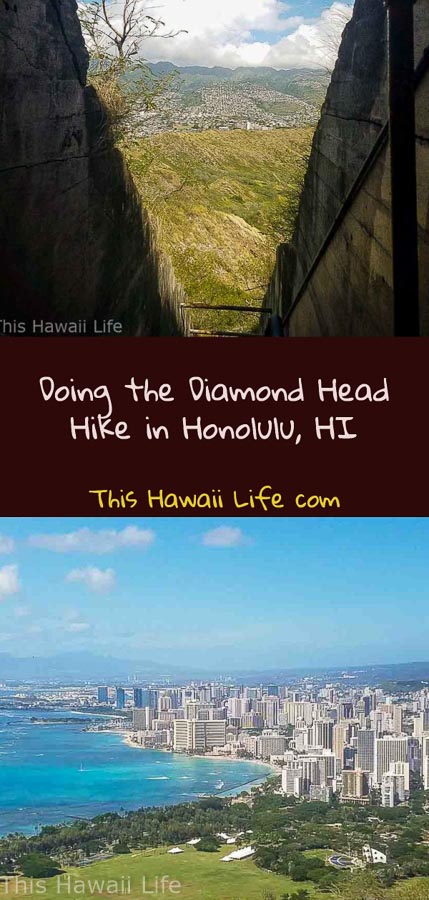
Weather and best time to visit Oahu
Oahu, known as “The Gathering Place,” is the most populous of the Hawaiian Islands and offers a diverse range of attractions, from beautiful beaches to historical sites and cultural experiences. The best time to visit Oahu depends on your preferences for weather, activities, and crowd levels. Here’s an overview of Oahu’s weather and the ideal times to plan your trip:
Weather Overview:
- Year-Round Tropical Climate: Oahu enjoys a tropical climate, characterized by warm temperatures and high humidity throughout the year. It has two main seasons: a dry season (summer) and a wetter season (winter). However, even during the wetter season, rainfall is usually brief and intermittent.
- Summer (June to August): Oahu’s summer months are warm and relatively dry, with temperatures typically ranging from 75°F to 88°F (24°C to 31°C). These months offer plenty of sunshine and are ideal for beach activities, water sports, and outdoor exploration. Summer is the peak tourist season, so expect larger crowds and higher prices.
- Fall (September to November): Fall is a fantastic time to visit Oahu. The weather remains warm, with temperatures between 73°F and 87°F (23°C to 31°C). Rainfall is minimal during this time, and you can enjoy the island with fewer crowds. It’s an excellent time for both outdoor activities and cultural events.
- Winter (December to February): Oahu’s winter is mild, with temperatures averaging between 68°F and 80°F (20°C to 27°C). This is the rainy season, especially on the windward (eastern) side of the island. While you might encounter some rain, it’s still possible to enjoy Oahu’s attractions, and you’ll find fewer tourists during this time.
- Spring (March to May): Spring is similar to fall, with pleasant temperatures ranging from 69°F to 82°F (21°C to 28°C). The island starts to dry out from the winter rains, and the landscape becomes lush and green. Spring is an excellent time to visit for both weather and smaller crowds.
Best Times to Visit Oahu:
- Late Spring (April to June): This period offers great weather with warm temperatures and minimal rainfall. It’s an excellent time to enjoy outdoor activities, explore the island, and avoid the peak summer crowds.
- Fall (September to November): Fall is another fantastic time to visit Oahu. The weather is still warm, and you can enjoy the island with fewer tourists, making it easier to find accommodations and enjoy popular attractions.
Considerations:
- Peak Tourist Season: If you don’t mind larger crowds and higher prices, visiting during the summer (June to August) can still be enjoyable, especially if you plan well in advance.
- Water Activities: Oahu offers a wide range of water activities, including surfing, snorkeling, and paddleboarding. Be sure to check the ocean conditions and surf reports for safety.
- Festivals and Events: Oahu hosts various cultural events and festivals throughout the year, so check the event calendar to see if any align with your travel dates.
In conclusion, Oahu’s tropical climate means you can visit year-round, but late spring and fall offer a good balance of pleasant weather and fewer crowds. However, any time of year can be a great time to explore this dynamic island and experience its natural beauty and vibrant culture.
Diamond Head hike FAQ
Is the Diamond Head hike difficult
It is all uphill with stairs to get to the last segment and the State of Hawaii calls it a moderate hike to do. If you take your time, take some rests and go in the cooler morning or later part of the afternoon it would be easier for people that are physically challenged.
Is it worth it to hike to the top of Diamond Head?
It’s a short but steep uphill hike to the top of the crater rim but the views and experience climbing up to Diamond Head is exhilerating and not to be missed.
What is the best time of day to hike up to Diamond Head?
Weekday mornings is best to avoid the crowds and early morning when the sun is still rising and not so hot, plus you get early sunrise or morning views with little crowds visiting at this time frame.
Can you hike Diamond Head without a tour?
Absolutely, you can hike on your own without a tour and challenge yourself to do this phenomenal hike to the top.
Conclusion to doing the Diamond Head hike and State Monument
In conclusion, the Diamond Head Hike offers an unforgettable experience for nature lovers, adventure seekers, and anyone who wants to take in some breathtaking views of Honolulu and the Pacific Ocean. From the challenging ascent to the stunning summit, this iconic landmark is a must-visit for anyone traveling to Hawaii.
Thanks for visiting today and checking out this post on the Diamond Head Hawaii and crater rim views. I hope you are inspired to plan a visit and enjoy these wonderful attractions. If you enjoyed the images and post, could you please share it with any of the social media buttons located around the post.
If you like what you see, come and check out my other social media channels for more updates, including Instagram, Pinterest and Twitter
Some links in this article on Diamond Head Hawaii are affiliates which provide a small commission to support this site at no extra cost to you. Thank you for reading, and happy travels


0 Comments
Trackbacks/Pingbacks